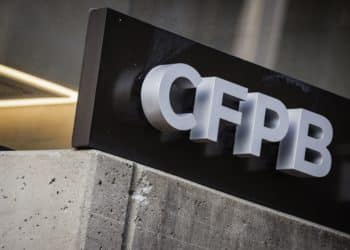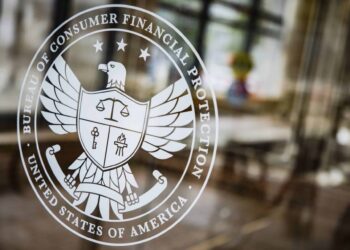Compliance Insider: Is the CFPB Over?

New Rules
Comment periods have recently closed on two important rules, each of which would adversely affect some industry participants. The rule on payday, auto title, and high-cost installment loans would, by the CFPB’s own estimation, render payday lending economically unsustainable and severely constrain the auto title and installment lending businesses. The ban on class waivers in pre-dispute arbitration agreements would significantly change the dynamic in private enforcement of consumer financial protection laws, re-enabling class-action litigation.
Conventional wisdom is that those rules will not be finalized before Jan. 20, 2017, when President-elect Donald Trump is sworn in, and after that, several measures may be taken to keep the rules “on ice” until the political process has played out.
First, the CFPB physically can’t finalize these rules any time soon. The cycle time from close of comment period to final rule publication for recent CFPB rules has ranged from nearly a year for a simple rule to almost two years for a more complex rule. The arbitration rule would take more than a year to complete competently, and the payday rule, which garnered more than a million public comments, is at least two or more years out.
Second, there are a number of things the new president can do on Jan. 20, not the least of which is fire CFPB Director Richard Cordray. The recent decision in PHH vs. Cordray, in which the U.S. Court of Appeals for the D.C. Circuit held that the statutory structure of the CFPB violated the separation of powers concepts inherent in the U.S. Constitution, authorized the president to fire the CFPB director at will. The CFPB has requested a rehearing by the entire panel of D.C. Circuit judges, and the outcome of that request remains to be seen. In the meantime, few would be surprised to hear a President Trump utter the words, “You’re fired!” Were that to happen, the question is whether Cordray would choose to sue the United States to keep his job.
Third, the new administration could stall the approval of new policies by including the CFPB in existing or future executive orders, including one freezing all new regulations. Whether this could stick depends on whether the PHH case stands. A president who can fire the director can tell him to follow an order.
Federal Law Speed Bumps
A little-used federal law, dating back to 1994 or so, allows Congress and the president to veto a new federal regulation by “resolution of disapproval.” This “veto” can pass the Senate — immune from a filibuster — and President Trump would likely sign it on Jan. 20. If a Congressional veto occurs, the agency involved is prohibited by statute from adopting any similar rule unless expressly authorized to do so in new legislation. Thus, the CFPB should tread carefully, as a rush to rulemaking risks not only eliminating the rule, but the authority to ever adopt a similar one.
New Legislation
In September, the House passed HR 5983, the Financial CHOICE Act. Title III of the bill significantly curtails CFPB independence and power, including converting it to a five-member commission. Dodd-Frank “repeal” was both a frequent talking point for candidate Trump and an issue where he can buy comity with traditional Republican leadership at little cost to standing with his voter base. The Financial CHOICE Act very well may be part of the first 100 days of a Trump administration.
Meanwhile, Sen. Elizabeth Warren (D-MA) has put down her marker against the bill in very clear terms. She commands great influence in a Senate minority with the numbers to filibuster indefinitely. Absent a rule change in the Senate to do away with the filibuster, the bill could languish in the Senate for a long time.
But delay in dealing with concerns about the CFPB, and a refusal to compromise, carries a very real risk for the CFPB. The PHH decision could survive all challenges and make the CFPB director an at-will employee. More importantly, Cordray’s term expires in July 2018, at which time President Trump can nominate a single anti-CFPB director, who will have five years to dismantle the work of the agency. To Democrats concerned with preserving the agency, converting the CFPB to a commission might be pretty appealing.
In short, a pyrrhic victory by Senate Democrats in delaying the Financial CHOICE Act could lead to much more permanent damage to the CPFB. Conversely, Congressional pursuit of a complete repeal of the CFPB would likely languish in the Senate indefinitely.
Is It Over?
Even if CFPB rules are curtailed or the agency goes away, there are 55 or so other state and federal regulators and AGs to worry about. At the federal level, a CFPB retrenchment could bring back the OCC, FDIC, FRB, NCUA, and
FTC. For fair lending issues, DOJ will still be at work.
Aggressive state regulators will continue to pressure both innovators and traditional industries. In addition, consumer advocate groups will likely pursue state referendum efforts similar to the successful campaign that has resulted in a 36% per annum rate cap in South Dakota. Those same advocates will also likely refocus efforts on state legislatures in attempts to add restrictions to state consumer credit laws.
No, it’s not over. It’s just a new game.
Richard P. Hackett is a partner in the Washington, D.C., office of Hudson Cook LLP. He is a frequent speaker and writer on a variety of consumer credit topics. Richard can be reached at 207-541-9556 or rhackett@hudco.com. Nothing in this article is legal advice and should not be taken as such. Please address all legal questions to your counsel.








